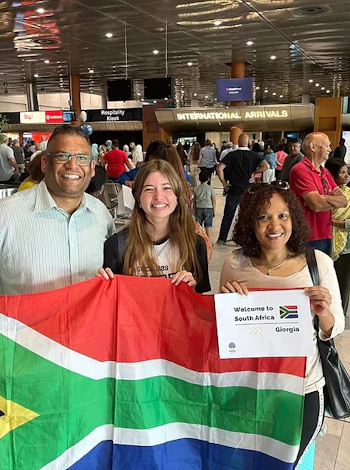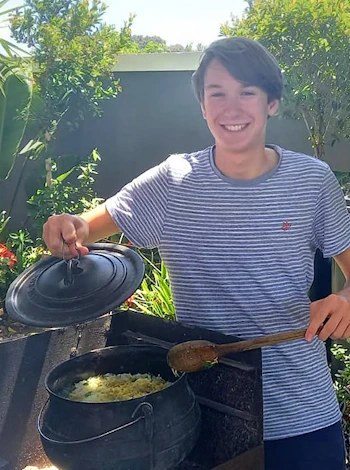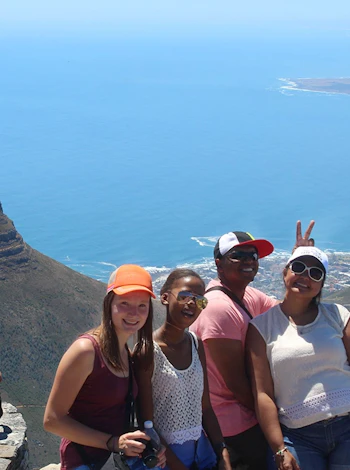High school exchange program
in South Africa
Discover South Africa from the inside, living with a South African family and attending a local high school for a short term, a semester or a year.
















Live like a local in the Rainbow Nation
Student exchange program in South Africa
South Africa, with its incredible diversity of cultures and landscapes, is a book to learn a lot from. Nine provinces, 11 official languages (including English and Afrikaans) and nicknamed the "Rainbow Nation", South Africa is a crossroads of cultures, with people from different backgrounds committed to living in harmony after a long history marked by apartheid.
With untouched nature, including gorgeous beaches and stunning nature reserves, alternating with large, bustling cities, South Africa is truly a land of contrasts. Get ready for an unforgettable experience made of different accents, multicultural schools and mysterious beauty, best observed up close.

South African magic turned into reality
Safaris and the environment
South Africa is one of the best places in the world to go on a safari and see the famous "big 5": lion, buffalo, rhino, elephant and leopard. Besides the well-known Kruger National Park, there are many nature reserves where you can learn about conservation and discover the local fauna.
What’s high school like in South Africa?
Heritage and innovation
The South African education system honours its traditional roots, while also embracing innovation. During your exchange, you will experience ancestral wisdom intertwined with modern science and methodologies.
Self-empowerment
Attending school in South Africa will help you gain confidence in yourself and your skills. Transforming ideas into action, supported by the school body, means feeling empowered as an individual and as a community.
Social commitment
The Ubuntu philosophy is deeply embedded in the South African education system, where civic education is a recognised area of the curriculum. In a country that has produced leaders of the caliber of Nelson Mandela, that's not surprising!
Space for creativity
From painting classes at school, to living and breathing creativity on a daily basis - picture yourself walking around your South African neighbourhood, humming to the beat of township music permeating the streets... in the Rainbow Nation, you'll find pills of creativity at every corner.
A country full of contrasts: let it surprise you with an exchange experience!
Live the dream – trust WEP and prepare to be amazed.
On a Flex program to South Africa, you may be placed anywhere in the country, depending on the location of the host family who has chosen you to share this incredible adventure with. Ready to live life as a South African teenager?
Flex programs offer a very similar experience to Classic Exchange programs, with placement in a host family and enrolment in a local school. However, host families receive a payment or subsidy, and tuition fees are usually charged by the host school.
Flex programs are not registered and supervised by our Regulating Authorities in Australia, as they do not meet the requirement of a volunteer host family and a volunteer host school applying to Classic Exchange programs. However, WEP requires the same level of screening and quality of placements from the overseas partner organisations, and program rules and expectations of our students are the same.
Paid homestay family
Tuition fees included in the program fee
Placement anywhere in South Africa
Short-term, semester or year programs available
Your host family during your exchange year
Gain a second family – they can’t wait to welcome you into their lives!
Here is why:
Respect for others, empathy and selflessness are in the DNA of South Africans. Discover a second family you didn’t know you had!
South Africa is a kaleidoscope of cultures, colours and languages. Each family and each home are a world of their own, with traditions and stories that will paint your exchange... just like a rainbow!
From braai to traditional singing and dancing, you will learn about the ins and outs of modern South African culture and discover places that cannot be found on any travel guides. Ready to become a local?
South African teenagers are active participants in their community and grow up with a strong sense of social responsibility. Follow in their footsteps to discover a different outlook on life!



Your school in South Africa
Find out more about your school experience in the Rainbow Nation
Education in South Africa goes from grade R to grade 12, when students are 18 years old. School is divided into two main cycles, primary and secondary. Each cycle is further divided into two levels, junior and senior.
Schooling is compulsory for children between the ages of 7 and 15.
The education system
Subjects in South African schools are not dissimilar to those in Australia, with traditional subjects including English, mathematics, history, science and drama. You will also be able to discover new interests and passions thanks to interesting subjects on offer, such as environmental studies, technology, business studies, life orientation, and more.
Subjects in South Africa
Secondary schooling spans six years and is attended by students aged 13 to 18. It’s divided into two levels:
* Junior or lower secondary: comprising of years 7, 8 and 9 and compulsory for all students until they turn 15.
* Senior or uppwer secondary: years 10, 11 and 12. Not compulsory.
South African secondary school
All schools offer extra-curricular activities, including sports (with cricket, rugby and athletics amongst the most popular, but also tennis, swimming, water polo, volleyball, basketball, soccer...), music and creative/visual arts (design, cinema, photography) as well as volunteer projects. Get involved!
Extra-curricular activities
In public schools, the year is divided into four terms divided roughly as follows:
* Term 1: early February to end of March
* Term 2: end of April to end of June
* Term 3: mid-July to end of August
* Term 4: mid-October to mid-September
There are long holiday periods in between, and students generally attend school Monday to Friday.
Private schools may have different holiday dates, which vary in each province or institution.
The school calendar
Academic grading in South Africa is quite different to Australia. There are no letters or numbers, but levels going from 1 to 7, corresponding to percentages which assess the extent to which students have achieved their learning objectives. Level 7 is the highest score and corresponds to having reached 80-100% of the learning objectives. Level 1 is the lowest, a failing grade, as it means only 0-30% of the learning objectives have been achieved.
Grades in South Africa
Stories from students and parents who have been there
Here are the testimonials of families who have chosen WEP for their exchange experience.
Going with WEP is best
Since 1988, a wide choice of destinations and comprehensive assistance before, during and after your overseas program. WEP is the ideal partner for your big overseas adventure.
Like you, we also get to choose who we travel with: our schools, host families and overseas partner organisations are carefully selected.
We offer a custom-made insurance policy, specifically designed for our participants, and we have a solid network behind us.
Emergency assistance, overseas and from Australia, is available 7 days out of 7, 24 hours a day, 365 days a year.
Allowing all our participants to live their desired overseas experience is a mission, a challenge we're thrilled to accept.
FAQ
Your host family, local coordinator and your host organisation will provide you with support while you are overseas. WEP Australia will remain in contact with the host organisation and your parents to coordinate and support your experience. In case of an emergency, both you and your family will be able to call an emergency phone number that is answered 24/7.
You will be advised of your placement location, host family and host school as soon as feasible. This can range from a few months prior to departure, right up until departure, as a lot needs to happen behind the scenes before each student's placement process is complete and can be communicated to you with certainty. The placement process doesn't only include sourcing a suitable host family, but also finding availability at a local school, and completing all red tape (including, for example, lenghty criminal history checks in some countries). Prior to departure from Australia, all students will receive host family, host school and local coordinator details.
Independent travel is not permissible while on exchange. However, you will be able to travel with your host family, school, host organisation and other community groups such as sporting teams or scouts. Again, the foremost aim of the program is educational, and your priority for any holiday periods must be your host family, who will be investing a lot of time, energy and money into this experience - simply in return for your frienship and positive contribution to their household.
Generally speaking, overseas schools won't issue a diploma to exchange students who are only there for a short time and don't graduate at that school. You may however be provided with a honorary certificate, as well as a WEP certificate of completion, which however don't count towards credit or graduation in Australia.
Language experience is desirable, but not necessary, for most countries. However, some countries have mandatory language requirements. You'll find the specific requirements for each country listed on its page. Intensive language courses may, in some circumstances, meet language pre-requisites. WEP strongly recommends language preparation prior to departure as language knowledge is of enormous benefit in assisting you to quickly adapt to your new family, school and life.
Of course, there are English-speaking destinations available if you are not interested in learning another language.
No, it's the host families who choose the student they wish to invite into their home. Based on the documents you will submit as part of your WEP application, one lucky family will choose to open their home and hearts to you, which is why for all Exchange Classic programs, and many Flex programs as well, there is no avenue for students to choose a specific location.
It may be possible to live with an overseas family that you already know (excluding relatives of the student). However, the family will have to be screened and approved, prepared and supported by our partner organisation in the same manner as any other host family. School enrolment must also be available.
More questions?

